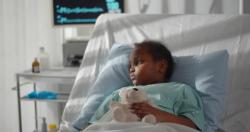The IMPACCT Rapid Paediatric Program aims to bring together services around the world to gather large amounts of data in a short space of time to improve care of children in palliative care or who are experiencing chronic pain.

Paediatrics
Physiotherapy for Respiratory Deterioration - series 54
Respiratory distress is one of the leading causes to parents presenting with their child to emergency departments, with symptoms being common, recurrent, and distressing. Contemporary research has identified deterioration in respiratory status as being associated with significantly increased morbidity, impacting quality of life, reduced participation and life expectancy.
Physiotherapy is a common first-line strategy requested to relieve increased work of breathing. Physiotherapists experience working with paediatric patients with multiple co-morbidities, including complex neurodisabilities. Choice of management strategy and response to deteriorations need to be individualised to each patient and condition.
By collecting data for this series, you will be helping us to understand current clinical practices of physiotherapy assessment and its impact by identifying key aspects that guide effective intervention selection for respiratory management of acute deteriorations in children and young people with life-limiting conditions.
Rapid Series Manual - Physiotherapy for Respiratory Deterioration series 54 (226KB)
Case Report form - Physiotherapy for Respiratory Deterioration Series 54 (PDF, 873KB)
Paediatric medicinal cannabinoids in palliative care - series 43
We want to understand what symptoms medicinal cannabis is being prescribed for in paediatric palliative care.
Medicinal cannabis may be useful for managing treatment-resistant epilepsy, pain and other symptoms that can affect many children in palliative care. Medicinal cannabis may have an adjuvant or complementary role in symptom management but supporting evidence for its use and the most suitable doses is limited.
This series is designed to capture information about what symptoms medicinal cannabis is being prescribed for, whether as a first line treatment or as an adjuvant.
If you’re prescribing medicinal cannabis in palliative care, you can collect data for this series.
LEARN MORE - READ THE SERIES MANUAL (PDF, 202KB)
COLLECT DATA - DOWNLOAD THE CASE REPORT FORM (PDF, 700KB)
Paediatric chronic pain
Ketamine for non-cancer pain - series 41

In this series, we are seeking to establish the broad utility and toxicity of ketamine for children with chronic non-cancer pain in real-life situations.
The series is designed to minimise the workload for any individual site through multi-site collaboration and enable Rapid data collection relatively quickly and easily.
In this study, the data points are at baseline then 48 hours, 72 hours, and 96 hours after baseline, and then three months after the ketamine infusion has ceased. This is reflective of the many conditions that required a longer-term involvement from paediatric chronic pain services and to ensure the opportunity for the majority of children to reach a therapeutic drug level.
If you are prescribing or administering ketamine to children with non-cancer pain, you can help us collect data to improve the available evidence about its effectiveness.
learn more - read the series manual (pdf, 151kn)
collect data - download the case report form (CRF) (pdf, 770kb) and the CRF appendix (pdf, 341kb)
Ketamine for cancer-related mucositis pain - series 42
In this series, we are seeking to establish the broad utility and toxicity of ketamine for children with chronic non-cancer pain and cancer pain in real-life situations.
The series is designed to minimise the workload for any individual site through multi-site collaboration and enable Rapid data collection relatively quickly and easily.
In this study, the data points are at baseline then 48 hours, 5 days and 10 days after baseline. This is reflective of the longer-term requirement for analgesia in children with mucositis during their cancer or bone marrow transplant treatment and to ensure the real-life use of ketamine is captured.
Help is collect data to improve the available evidence about the effectiveness of ketamine for children with cancer-related mucositis pain.
learn more - read the series manual (pdf, 154kB)
collect data - download the case report form (CRF) (pdf, 380kb) and the CRF appendix (pdf, 153kb)

